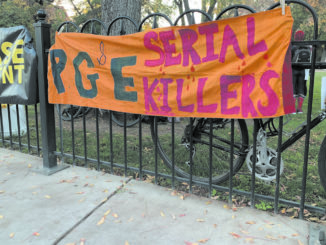
This column is part of special wildfire report on the one-year anniversary of the North Complex Fire’s destruction of Berry Creek and Feather Falls. Find links for more articles in this series at the end of this piece.
It didn’t take long for the Dixie Fire to bring it all back: The anxiety, sleeplessness and, yes, a fair bit of irritability. I’m speaking for myself, a journalist who spent a lot of time in Paradise in the days, weeks and months after the Camp Fire torched the Ridge.
It’s hard to believe we’re approaching the third anniversary of that blaze, the deadliest and most destructive in state history. With two additional megafires in Butte County in as many years, it’s almost like the flames of the Camp Fire were never fully doused.
It doesn’t help that PG&E likely is responsible for igniting the Dixie. I’d say it opens old wounds, but the truth is that many fire victims are still healing. For one thing, most haven’t been compensated by the utility giant or come close to rebuilding their lives. For another, the brown-gray smoke enveloping the valley is a constant reminder of Nov. 8, 2018.
I’ve been counting down the days until fall, when what I really need to do is adjust to the fact that our fire season is now eight or so months of the year, starting in April. It ends when we get decent precipitation, and, as we know, rainfall is occurring later and with less frequency. Remember that the Camp Fire wasn’t fully squelched until December.
For people who were affected by any of the fires, especially those whose loved ones were killed, this is a long and excruciating season.
I didn’t lose anyone, but I’ve definitely been feeling blue. As I said, I’ve also been a bit cross. Like, the other day, when I fired off a heated email to a senior editor at the Bay Area News Group, the publishing group owned by the same hedge fund that owns the San Jose Mercury News and the Chico Enterprise-Record.
I’d read a story in the Merc on the Dixie Fire that incorrectly reported that the Camp Fire killed 86 people. I clicked on the “report an error” link, doing the professional courtesy of alerting the paper to the factual error.
I tried to understand how they could have gotten it wrong and remembered that the number had fluctuated. There was a long stretch when a final toll was hampered by the difficult identification process, in several cases requiring DNA analysis on bone fragments. And at one point, the sheriff’s office announced that what was thought to be the remains of a few people were actually that of one. But eventually, it was determined that 85 were killed. That includes a burn victim who died nine months after the blaze, as well as a man who killed himself as the fire bore down.
The Merc would have gotten it right had an editor read its sister paper’s reporting on the subject or dug beyond the most cursory Google search. Yet, the aforementioned editor responded with links to dated stories, saying, “Lots of questions on the final number.”
That hasn’t been true for ages. The reality is that the story in the Merc was written by a green reporter who came into town to cover the Dixie, knew little about the blaze two years earlier, and did not receive adequate fact-checking. I fault her much less than an editor who doesn’t think he’s accountable to readers in this region.
I may have shot back an email with a word one might consider coarse, giving the editor more than enough info to correct the story. Still, as of this writing, the error remains.
Sure, I’m cranky. But it’s because I care. I’ve edited more than 300 stories on the Camp Fire, and last summer, while the CN&R was temporarily shuttered, I covered PG&E’s sentencing. I feel close to the subject matter, a topic of great importance in Butte County. Speaking of which, there are wildfire-related must-reads in this issue, which hits the newsstands roughly one year after the North Complex Fire roared into Butte County, destroying Berry Creek and Feather Falls. I’m talking about the best kind of community journalism, from professionals who care about getting it right.
I’ve seen numerous nits to pick in local disaster reporting by regional papers like the Merc, as well as a few national publications, but I’ve never felt compelled to send in a correction. It’s not pedantic to ask that a newspaper is accurate when it comes to the number of dead.
I probably shouldn’t be so peeved, but because Butte County is basically the wildfire epicenter of the West, I expect we’ll continue to see a lot of outlets parachuting in for the story. My advice to them: Report and edit it like you would in your own community.
Further reading:
“Wildfire country”
“Sparking debate”
“Our wildfire breaking point”




Be the first to comment